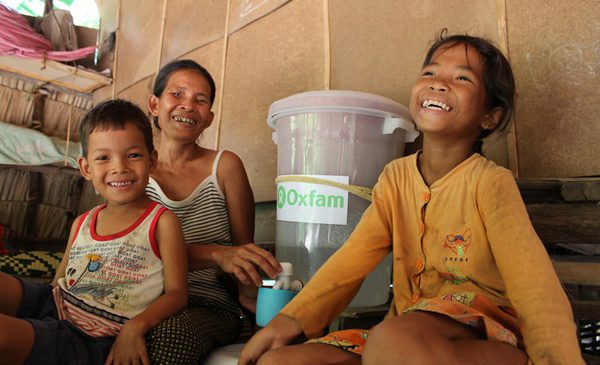
Water filters have created a wave of excitement in Takeo Province, Cambodia. Part of a huge water-focused project supported by AusAID, the filters will be of most benefit to women and children.
The struggle for clean water
As you turn on the tap and drink the water coming out, imagine this: walking at least 6km most days to collect firewood, boiling kettle after kettle of water on a fire and then finally being able to have a reasonably safe drink. Some days you don’t have the spare three hours it takes to do all this, but you’re still thirsty, particularly in 30+ degree heat. What then? You can buy firewood, but then you lack the money for food. Or you can quench your thirst with un-boiled water and get sick. You’ll then be unable to do much, as your stomach churns away. The only way to get better is to spend at least a full day’s income for a doctor and medicine. This was your family’s food budget for the day, so now everyone is eating less. For Doung Srun, 68, this meant “I needed to sell a small piece of land to get money to pay for treatment. Frankly, this is how it is.”
In rural Cambodia, the lengthy process of getting drinkable water usually falls to women and children. Often regarded as a “household” duty, women and children are left with little choice but to go through the daily ritual. Then when sickness hits, children feel the brunt of it. “My nieces and I would get sick very often with diarrhea,” says Phat Sokunty. “Because of sickness, my nieces would miss a lot of school and not have much time for study or to help with rice farming.”
In a cruel twist, if children don’t get the water chores done, they are the most likely to get sick. Missing school then reinforces the cycle of disadvantage. For women, adding sickness to the daily routine makes it even more difficult to pursue other things in life. A solution that makes it easier to create clean water would have an amazing impact on education, health, income, free time and the environment.
Along comes a clay jar that works as a water filter.
I never doubted the importance of water filters, but our trip to Takeo reinforced my love of this simple yet brilliant device. Speaking with families that had just received filters, the excitement was immense. “I am really happy that I meet with you,” says Srun with a beaming smile. “I am really very happy that Oxfam give me a very important thing with a big value that can help my family because it reduces disease.” Srun received the filter the day before and was thrilled about the opportunities it would bring. “Now I can use this time to collect cow manure and put it on the garden,” she said. “This is how I will use the time that I save from not boiling water.”
Also in Takeo, Srun Phalla, 34, is busy expanding her sewing business with her newly found spare time—and her kids haven’t missed a day of school since the family received their filter a month ago. “With this free time, I can do other business. I have a small business sewing and selling gloves. I earn about 6000-7000 riel (AUD $1.60) per day. Now I no longer need to use this money to buy medicine. So now I can save some money to buy other things the family needs and to support my family. The filter makes our lives better than before.”
Providing so much more than clean water, a water filter supports women and children to find their own way out of poverty. Changes like this are so simple, yet so inspiring. I will never forget the energy and smiles of Srun the day after receiving her filter.